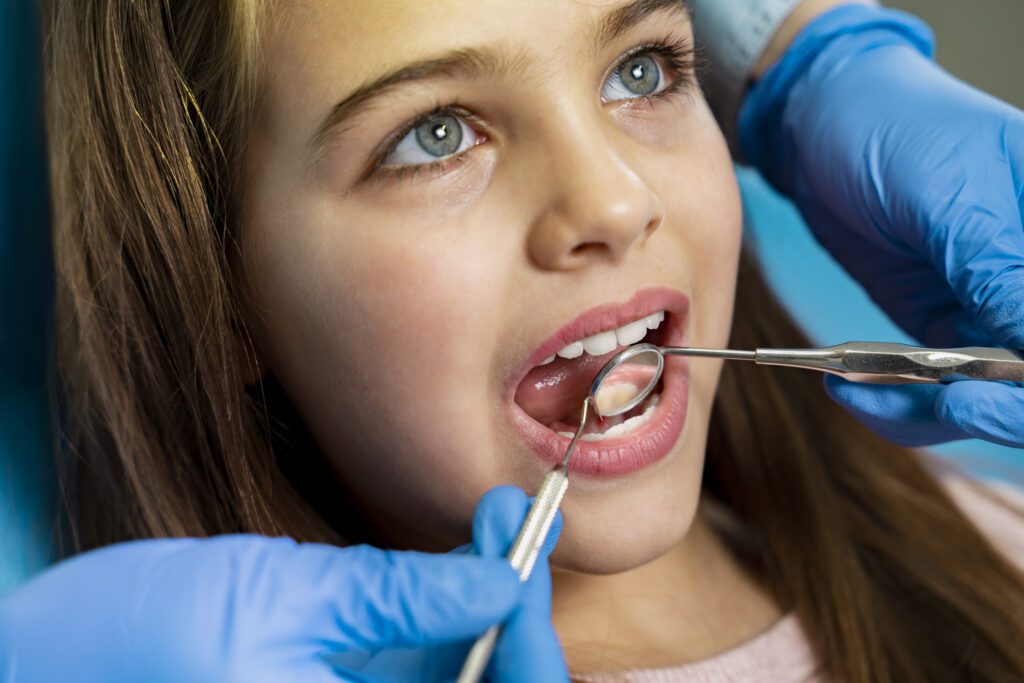Many patients think of pain and discomfort when they think of tooth extractions. This routine general dental treatment has a bad reputation among many patients. But did you know that extractions are meant to relieve pain? Patients with impacted, infected, or even overcrowded teeth experience pain relief once they receive extraction treatment.
Our dental office always ensures patients feel as comfortable as possible during treatment. We also help patients with questions about the post-treatment healing process to minimize discomfort after extraction treatment. Learn about the different types of tooth extraction treatment in our Colmar, PA office.

Tooth Extraction Treatment in Colmar, PA
We ensure patient comfort throughout treatment, whether patients require a quick, simple extraction or more complex extraction treatment. Simple tooth extractions remove teeth above the gum line. Complex or surgical extractions remove teeth at or beneath the gum line.
We recommend that patients keep gauze at the extraction site or sites directly after extraction. Gauze helps stave bleeding and also helps create a blood clot to protect the nerves at the extraction site. We also recommend that patients take pain medication and hold an ice pack to their cheeks to lessen swelling.
What are Impacted Wisdom Teeth?
The wisdom teeth, also known as the third molars, typically emerge in patients’ late teens or early twenties. Wisdom teeth grow behind the back molars. However, if wisdom teeth are impacted, we must remove them to prevent further problems. Impacted teeth occur when there is not enough room in the mouth for the wisdom teeth to grow.
Patients can experience dental pain, swelling, overcrowding, tooth damage, or other dental health issues if they have impacted wisdom teeth. Please contact our office if you notice pain behind your molars. Your wisdom teeth may be growing. We will plan your wisdom tooth extraction treatment and customize care to your needs.
Frequently Asked Questions
Can I drive myself home after a wisdom tooth extraction?
If you receive local anesthesia, you can drive home. However, if you are sedated or under general anesthesia, you will need someone to drive you. It’s best to arrange for a ride, as grogginess and dizziness are common after sedation.
Will removing a tooth change the shape of my face?
Facial structure changes are minimal if a back or wisdom tooth is removed. However, if multiple teeth are extracted, bone loss over time can affect facial appearance. Dental implants or bone grafting can help prevent long-term changes.
What can I do to speed up healing after an extraction?
Rest for the first 24 hours, avoid smoking, alcohol, and heavy exercise, and follow your dentist’s cleaning instructions. Applying an ice pack and eating soft foods also helps reduce swelling and discomfort. Proper oral hygiene prevents infection and promotes healing.
Do wisdom teeth always need to be removed?
Not always. If wisdom teeth fully erupt without causing pain, infection, or shifting other teeth, they may not need removal. However, impacted or partially erupted wisdom teeth often lead to problems later, so many dentists recommend extraction as a preventive measure.
What is the difference between a simple and surgical extraction?
A simple extraction is done with forceps when the tooth is visible and easily removable. A surgical extraction is needed when the tooth is impacted, broken below the gumline, or difficult to remove. Surgical extractions often require incisions and sometimes bone removal.
Can I brush my teeth after a tooth extraction?
Yes, you can brush your teeth after an extraction, but be careful around the extraction site. Continue brushing other teeth normally to maintain oral hygiene, but avoid the surgical area for the first 24 hours. After that, gently clean around the site without disrupting the blood clot. Maintaining oral hygiene helps prevent infection during healing.
Request a Dental Appointment
Do you have a severely decayed tooth? Are you experiencing pain from your wisdom teeth? Contact Dental Health Group for treatment today at (215) 774-6702. You may also request a dental consultation with our team online. We want you to feel comfortable throughout treatment and the healing process.
